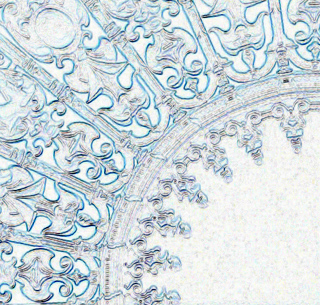Good news for anyone interested in the nature and content of our universe: NASA has reversed course and decided to repair the Hubble Space telescope. For many with an interest in astronomy, the idea that this fine instrument would be allowed to fall out of orbit seemed quite mad.
The refit, which should take place in 2008, should extend the life of the telescope until at least 2013. The primary objective will be to replace failing batteries and gyroscopes, though new instruments will also be installed.
The Hubble instrument has already generated some of the most important data in the history of astronomy and cosmology, including totally new information on very distant objects generated through the use of gravitational lenses: where the light-bending properties of galaxies are used on a massive scale to resolve extremely distant objects. Since the light being observed has been traveling for so long, such views are also a glimpse into a much earlier time in the development of the universe.
In contrast to manned space flight – which is inspirational but not always very scientifically useful – it is this kind of experimentation that we should be focusing our research dollars and efforts upon.


Hubble mission will be devilishly complex.
Your post assumes some inherent good in the knowledge gathered through the teloscope, as opposed to the merely inspirational value of manned space flight. I agree that the Hubble is essential, but I think so mostly as a source of inspiration, and of keeping astronomers happy. Do astronomers anymore discover “useful” pieces of science? i.e. technologically useful? Or useful for planning in some way?
I think in general, our problem is not “not having enough science”, but an inability to act rationally on the basis of the good data we do have. This is true not only for environmental issues, but also for sociological ones.
The Herschel Telescope Close To Blast Off
“The Herschel space observatory, the European Space Agency’s answer to the Hubble Telescope, is about to be sent into orbit. With a mirror 1.5 times the size of the Hubble mirror, the Herschel will look at the universe in the infrared and sub-millimeter range. This ‘will permit Herschel to see past the dust that scatters Hubble’s visible wavelengths, and to gaze at really cold places and objects in the Universe — from the birthing clouds of new stars to the icy comets that live far out in the Solar System.'”
Hubble Space Telescope:
Important discoveries
* measure distances to Cepheid variable stars more accurately than ever before, and thus constrain the value of the Hubble constant, the measure of the rate at which the universe is expanding, which is also related to its age.
* uncovered evidence that, far from decelerating under the influence of gravity, the expansion of the universe may in fact be accelerating.
* establishing the prevalence of black holes in the nuclei of nearby galaxies.
* evidence for the presence of extrasolar planets around sun-like stars
Impact on astronomy
Challenges Ahead In Final Hubble Servicing Mission
Hugh Pickens writes “Space shuttle Atlantis is slated to lift off Monday on the fifth and final servicing mission to Hubble with four mission specialists alternating in two-astronaut teams will attempt a total of five spacewalks from Atlantis to replace broken components, add new science instruments, and swap out the telescope’s six 125-pound (57-kilogram) batteries, original parts that have powered Hubble’s night-side operations for nearly two decades. ‘This is our final opportunity to service and upgrade Hubble,’ says David Leckrone, senior project scientist for the Hubble Space Telescope. ‘So we’re replacing some items that are getting long in the tooth to give Hubble longevity, and then we’ll try to take advantage of that five- to 10-year extra lifetime with the most powerful instrumental tools we’ve ever had on board.’ Some of the upgrades are relatively straightforward and modular: yank out old part, put in new. But they’re big parts: The ‘fine guidance sensors’ sound delicate but weigh as much as a grand piano back on Earth. But what’s different this time is that the astronauts will also open up some instruments and root around inside, doing Geek Squad-like repairs while wearing bulky spacesuits and traveling around the planet at 17,000 mph. ‘We have this choreographed almost down to the minute of what we want the crew to do. It’s this really fine ballet,’ said Keith Walyus, the servicing mission operations manager at Goddard. ‘We’ve been training for this for seven years. We can’t wait for this to happen.'”
This is one argument for manned spaceflight. Robots couldn’t perform repairs of this kind.
Fifth spacewalk energises Hubble
Space shuttle astronauts have embarked on the fifth and final spacewalk to repair the Hubble Space Telescope.
Mission specialists John Grunsfeld and Andrew Feustel have replaced three batteries, so that Hubble now has a brand new complement.
They have also replaced one of the telescope’s three fine-guidance sensors which keep the telescope’s gaze precisely fixed for observations.